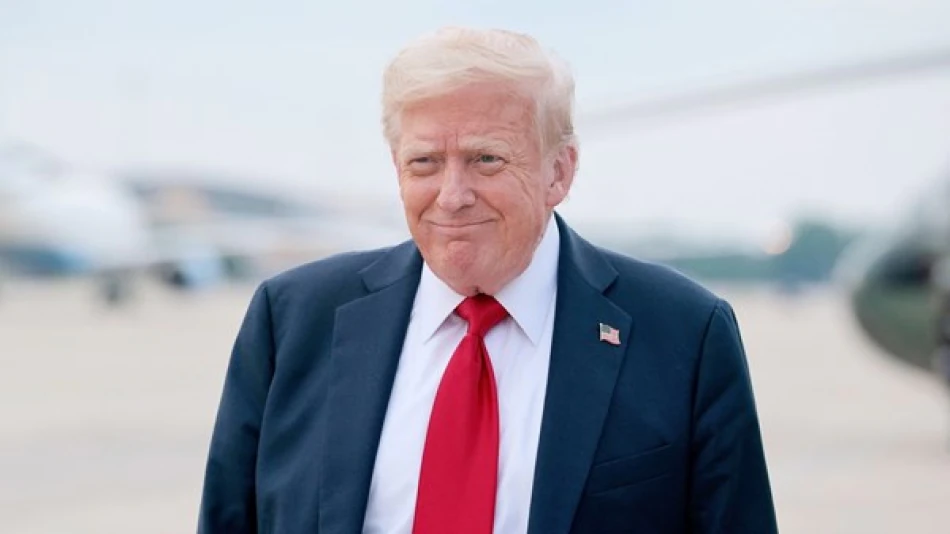
Trump Sets Deadline to Evaluate Ukraine Peace Prospects Amid Crisis
Trump's Two-Week Ultimatum: A High-Stakes Gamble on Ukraine Peace
President Donald Trump has set a bold two-week deadline to assess the viability of Ukraine peace negotiations, signaling that his administration may pivot to alternative strategies if diplomatic efforts fail to yield results. The ultimatum comes as Trump struggles to deliver on his campaign promise to end the three-year conflict swiftly, despite recent high-level meetings with both Russian President Vladimir Putin and Ukrainian President Volodymyr Zelensky.
The Diplomatic Chess Game Intensifies
In a phone interview with Newsmax, Trump stated, "I think within two weeks we'll know the outcome," before adding ominously that "after that, we may have to take a different course." The president refrained from elaborating on what this alternative path might entail, leaving both allies and adversaries to speculate about potential shifts in U.S. policy.
This timeline represents a significant escalation in Trump's approach to the Ukraine crisis, which began in February 2022. The president's confidence in setting such a specific deadline suggests either genuine momentum in behind-the-scenes negotiations or a calculated pressure tactic designed to force both parties toward compromise.
Recent Diplomatic Activity
The two-week ultimatum follows a flurry of diplomatic activity. Last Friday, Trump met with Putin at a summit in Alaska, though the meeting concluded without any apparent breakthrough. On Monday, the president hosted Zelensky at the White House alongside several European allies, creating what many observers hoped would be the groundwork for direct Putin-Zelensky talks.
Initially, both leaders appeared open to the possibility of a direct summit, raising expectations that Trump's mediation efforts might finally gain traction. However, the lack of concrete progress has evidently prompted the president to impose this decisive timeline.
The Reality Check on Campaign Promises
Trump's current predicament highlights the vast gulf between campaign rhetoric and geopolitical reality. His 2024 election promise to resolve the Ukraine conflict "in one day" now appears optimistic at best, as the war approaches its third anniversary with both sides maintaining entrenched positions.
The conflict has fundamentally reshaped European security architecture, strengthened NATO unity, and created deep economic interdependencies through sanctions regimes. These structural changes cannot be easily unwound through presidential decree or even skillful diplomacy.
Strategic Implications and Market Considerations
Trump's two-week deadline carries significant implications for global markets and international relations. Energy markets, already sensitive to Ukraine-related developments, will likely experience heightened volatility as traders position for potential policy shifts. Defense contractors and European allies will be closely monitoring whether Trump's "different course" might involve reduced U.S. military aid or pressure on NATO partners to assume greater responsibility.
The ultimatum also tests Trump's negotiating credibility on the world stage. Success would validate his transactional approach to foreign policy, while failure could diminish his leverage in future international crises, particularly with China watching closely as it considers its own strategic calculations regarding Taiwan.
Historical Precedent and Expectations
Previous attempts at Ukraine peace negotiations have consistently foundered on fundamental disagreements over territorial sovereignty and security guarantees. The 2022 Istanbul talks, various Minsk agreements, and multiple ceasefire attempts have all collapsed when confronted with the core issue: Russia's territorial demands versus Ukraine's sovereignty claims.
Trump's approach differs in its emphasis on personal diplomacy and transactional deal-making, but the underlying contradictions remain unchanged. Putin continues to demand recognition of territorial gains, while Zelensky maintains that Ukrainian sovereignty is non-negotiable.
The High-Stakes Gamble
By setting such a specific timeline, Trump has effectively created a public test of his diplomatic effectiveness. Success within two weeks would represent a remarkable achievement that has eluded international mediators for years. Failure, however, could force Trump into escalatory measures that might include increased military support for Ukraine, enhanced sanctions on Russia, or conversely, reduced American engagement altogether.
The president's willingness to impose this deadline suggests confidence in behind-the-scenes progress that may not be publicly visible. Alternatively, it may represent a calculated risk designed to break the current diplomatic stalemate through the application of presidential pressure and public accountability.
As the two-week clock begins ticking, global attention will focus intensely on any signs of movement from Moscow and Kyiv, while allies and adversaries alike prepare for the potential consequences of Trump's promised "different course" should diplomacy fail to deliver.
Most Viewed News

 Layla Al Mansoori
Layla Al Mansoori






